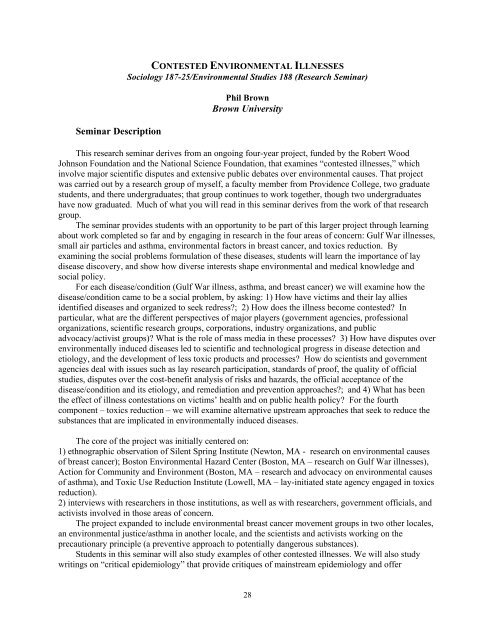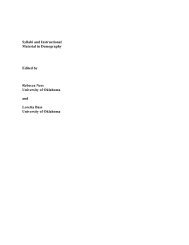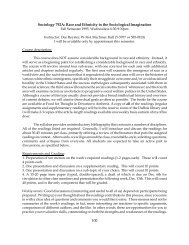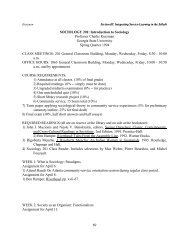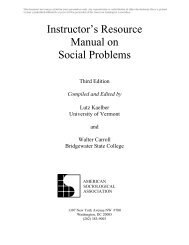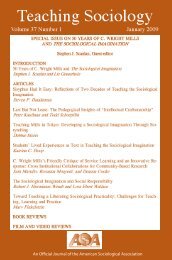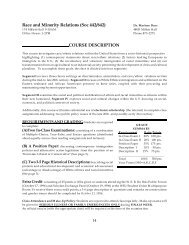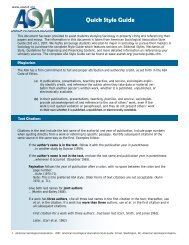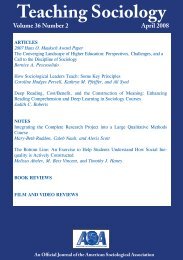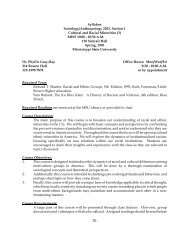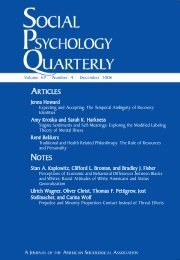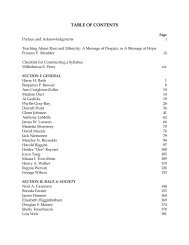Environmental Sociology - American Sociological Association
Environmental Sociology - American Sociological Association
Environmental Sociology - American Sociological Association
Create successful ePaper yourself
Turn your PDF publications into a flip-book with our unique Google optimized e-Paper software.
Seminar Description<br />
CONTESTED ENVIRONMENTAL ILLNESSES<br />
<strong>Sociology</strong> 187-25/<strong>Environmental</strong> Studies 188 (Research Seminar)<br />
Phil Brown<br />
Brown University<br />
This research seminar derives from an ongoing four-year project, funded by the Robert Wood<br />
Johnson Foundation and the National Science Foundation, that examines “contested illnesses,” which<br />
involve major scientific disputes and extensive public debates over environmental causes. That project<br />
was carried out by a research group of myself, a faculty member from Providence College, two graduate<br />
students, and there undergraduates; that group continues to work together, though two undergraduates<br />
have now graduated. Much of what you will read in this seminar derives from the work of that research<br />
group.<br />
The seminar provides students with an opportunity to be part of this larger project through learning<br />
about work completed so far and by engaging in research in the four areas of concern: Gulf War illnesses,<br />
small air particles and asthma, environmental factors in breast cancer, and toxics reduction. By<br />
examining the social problems formulation of these diseases, students will learn the importance of lay<br />
disease discovery, and show how diverse interests shape environmental and medical knowledge and<br />
social policy.<br />
For each disease/condition (Gulf War illness, asthma, and breast cancer) we will examine how the<br />
disease/condition came to be a social problem, by asking: 1) How have victims and their lay allies<br />
identified diseases and organized to seek redress?; 2) How does the illness become contested? In<br />
particular, what are the different perspectives of major players (government agencies, professional<br />
organizations, scientific research groups, corporations, industry organizations, and public<br />
advocacy/activist groups)? What is the role of mass media in these processes? 3) How have disputes over<br />
environmentally induced diseases led to scientific and technological progress in disease detection and<br />
etiology, and the development of less toxic products and processes? How do scientists and government<br />
agencies deal with issues such as lay research participation, standards of proof, the quality of official<br />
studies, disputes over the cost-benefit analysis of risks and hazards, the official acceptance of the<br />
disease/condition and its etiology, and remediation and prevention approaches?; and 4) What has been<br />
the effect of illness contestations on victims’ health and on public health policy? For the fourth<br />
component – toxics reduction – we will examine alternative upstream approaches that seek to reduce the<br />
substances that are implicated in environmentally induced diseases.<br />
The core of the project was initially centered on:<br />
1) ethnographic observation of Silent Spring Institute (Newton, MA - research on environmental causes<br />
of breast cancer); Boston <strong>Environmental</strong> Hazard Center (Boston, MA – research on Gulf War illnesses),<br />
Action for Community and Environment (Boston, MA – research and advocacy on environmental causes<br />
of asthma), and Toxic Use Reduction Institute (Lowell, MA – lay-initiated state agency engaged in toxics<br />
reduction).<br />
2) interviews with researchers in those institutions, as well as with researchers, government officials, and<br />
activists involved in those areas of concern.<br />
The project expanded to include environmental breast cancer movement groups in two other locales,<br />
an environmental justice/asthma in another locale, and the scientists and activists working on the<br />
precautionary principle (a preventive approach to potentially dangerous substances).<br />
Students in this seminar will also study examples of other contested illnesses. We will also study<br />
writings on “critical epidemiology” that provide critiques of mainstream epidemiology and offer<br />
28


